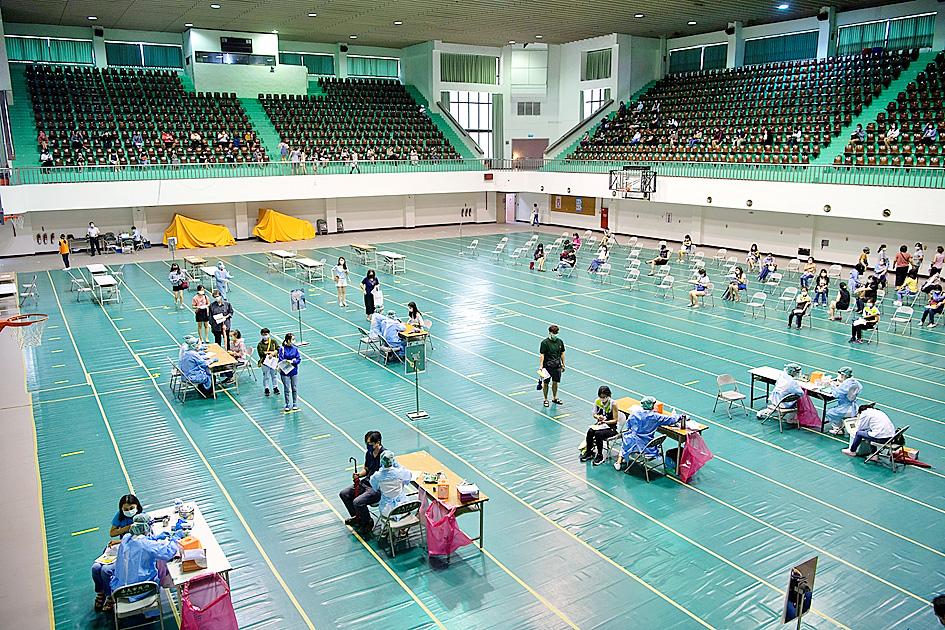People who get vaccinated against COVID-19 under a government-subsidized program would no longer have to pay administrative surcharges, the Central Epidemic Command Center (CECC) said yesterday.
The NT$300 (US$10.82) administration fee for the jabs would be waived from today, eliminating all out-of-pocket fees for government-funded COVID-19 vaccines, the center said.
On Saturday, the CECC said that the fee would not be covered by a NT$4 billion COVID-19 relief budget approved last week.

Photo: Ting Wei-chieh, Taipei Times
Part of the funding would be allocated to local governments for setting vaccine sites, it said.
Taipei and New Taipei City offer the subsidized jabs to medical workers, epidemic prevention workers and other workers at higher risk of COVID-19 exposure, while the rest of the nation only offers the free vaccines to medical workers.
As of Thursday last week, 678,418 doses had been administered nationwide, the CECC said.
Meanwhile, Tzeng Yi-suo (曾怡碩) and Chang Tun-cheng (張敦程), researcher at the Institute for National Defense and Security Research, in a report on Saturday said that the CECC should set up vaccination sites similar to military field hospitals or assign military personnel to conduct open-air mass inoculations.
The comments came after the CECC on Wednesday last week said that it aims to administer 1 million doses per week, and would therefore establish community inoculation stations, large-scale inoculations sites and outreach services.
Tzeng and Chang said that clinics and hospitals that offer vaccinations have said that they would have to establish a reservation system to avoid crowding, prompting the CECC and some hospitals to discuss the establishment of large-scale vaccination sites operated by hospital staff.
The report seeks to inform the CECC of how the military would set up field hospitals in the event of a chemical warfare attack, they said, adding that the contingency planning involves collection points, medical stations, transport and quarantine facilities.
The military could assist in conducting large-scale inoculations, they said.
Separately, the Buddhist Compassion Relief Tzu Chi Foundation on Saturday said that it can provide 40 sites for outdoor inoculation and that it invited government officials to inspect them.

ALIGNED THINKING: Taiwan and Japan have a mutual interest in trade, culture and engineering, and can work together for stability, Cho Jung-tai said Taiwan and Japan are two like-minded countries willing to work together to form a “safety barrier” in the Indo-Pacific region, Premier Cho Jung-tai (卓榮泰) yesterday said at the opening ceremony of the 35th Taiwan-Japan Modern Engineering and Technology Symposium in Taipei. Taiwan and Japan are close geographically and closer emotionally, he added. Citing the overflowing of a barrier lake in the Mataian River (馬太鞍溪) in September, Cho said the submersible water level sensors given by Japan during the disaster helped Taiwan monitor the lake’s water levels more accurately. Japan also provided a lot of vaccines early in the outbreak of the COVID-19 pandemic,

The Ministry of Foreign Affairs (MOFA) yesterday voiced dissatisfaction with the Comprehensive and Progressive Agreement for Trans- Pacific Partnership (CPTPP), whose latest meeting, concluded earlier the same day, appeared not to address the country’s application. In a statement, MOFA said the CPTPP commission had "once again failed to fairly process Taiwan’s application," attributing the inaction to the bloc’s "succumbing to political pressure," without elaborating. Taiwan submitted its CPTPP application under the name "Separate Customs Territory of Taiwan, Penghu, Kinmen and Matsu" on Sept. 22, 2021 -- less than a week after China

Kaohsiung Mayor Chen Chi-mai (陳其邁) on Monday announced light shows and themed traffic lights to welcome fans of South Korean pop group Twice to the port city. The group is to play Kaohsiung on Saturday as part of its “This Is For” world tour. It would be the group’s first performance in Taiwan since its debut 10 years ago. The all-female group consists of five South Koreans, three Japanese and Tainan’s Chou Tzu-yu (周子瑜), the first Taiwan-born and raised member of a South Korean girl group. To promote the group’s arrival, the city has been holding a series of events, including a pop-up

A home-style restaurant opened by a Taiwanese woman in Quezon City in Metro Manila has been featured in the first-ever Michelin Guide honoring exceptional restaurants in the Philippines. The restaurant, Fong Wei Wu (豐味屋), was one of 74 eateries to receive a “Michelin Selected” honor in the guide, while one restaurant received two Michelin stars, eight received one star and 25 were awarded a “Bib Gourmand.” The guide, which was limited to restaurants in Metro Manila and Cebu, was published on Oct. 30. In an interview, Feng Wei Wu’s owner and chef, Linda, said that as a restaurateur in her 60s, receiving an